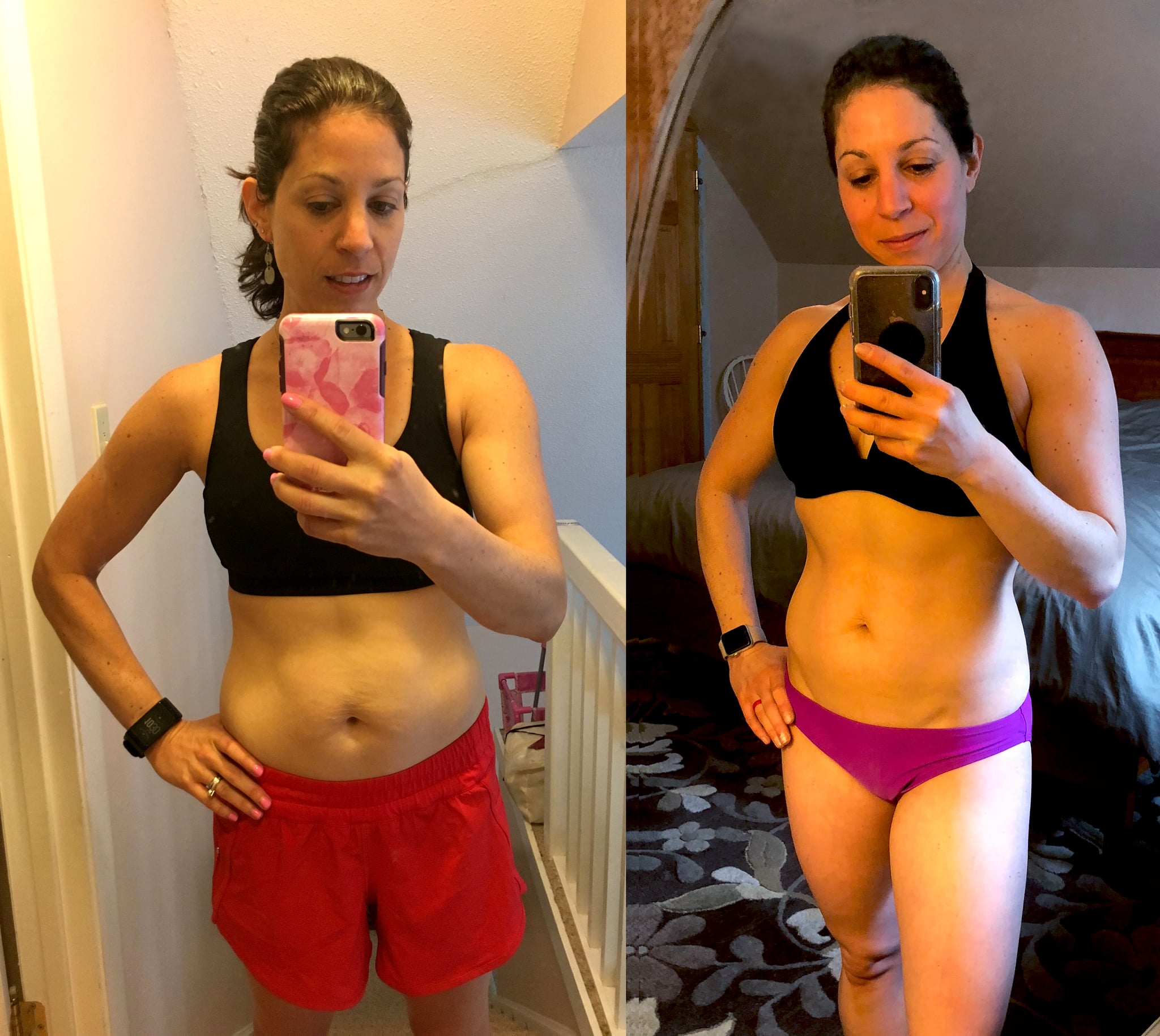Will Intermittent Fasting Help Me Lose Belly Fat?
After Years of Failed Diets, Intermittent Fasting Is What Helped Me Lose Belly Fat
About two years ago, I was in the store with my two kids and someone asked me when I was due. I looked down at my belly and said, "I'm not." This was the second time I'd been asked about my "baby;" the first time was in college after gaining 40 pounds. I felt pretty defeated. My entire life, I've always had a little belly and have always felt self-conscious. I exercise regularly and eat healthy, but came to accept that this is how my body is meant to look. Or is it?

What I Tried That Didn't Work
In college, I started running and doing a ton of yoga. I cleaned up my junk food vegan diet and ended up losing the weight, but still had belly fat. I got married, had two children, gained and lost about 45 to 50 pounds each time, and by then, my belly was still "squishy" (my son's loving words).
By 2016, I was about to turn 40 and was done having kids. I was ready to go all in and pursue my goal of losing my belly fat. I wanted to see what would happen if I put in 110 percent effort with exercise and diet, so in July 2016, I decided to give CrossFit a try. After eight months, I actually gained weight. Some of it was muscle, which I was so psyched about, but some of it was body fat because CrossFit made me so hungry that I just wanted to eat all day.
What I Tried That DID Work
I didn't want to give up CrossFit because I loved the strength and confidence I had gained, but it was clear that I needed to change something. In February 2017, I came across videos about intermittent fasting (IF). I learned about all the benefits of IF — disease prevention, improved digestion and decreased bloating, more mental clarity, and weight loss. Intermittent fasting isn't a diet; it's a lifestyle. You choose a period of time during the day to eat (eating window) and a period of time to not eat (fasting window). I chose the 16:8 plan, where you fast for 16 hours, and eat for eight — it made the most sense for my schedule.
I was shocked that just by skipping breakfast and eating from noon until 8 p.m., after just one month, I looked slimmer. I kept going. After three months, I looked even leaner, and by month six of IF, I'll never forget looking in the mirror and seeing my body change even more. This was something I was able to maintain because by one year of intermittent fasting, I was able to keep the belly fat off.
Why the Experts Say IF Works
Now for the science talk. Why has intermittent fasting been so successful for me when everything else I've tried has failed me? Aside from this being a sustainable lifestyle, certified dietitian Leslie Langevin, MS, RD, CD, of Whole Health Nutrition says that intermittent fasting "gets your body out of 'storage mode' and mobilizes fat stores for energy." This means that without having a constant food source, your body will dip into the fat it already has stored as its energy source, and in my case, that fat was in my belly.
Dr. Daryl Gioffre, a celebrity nutritionist and longevity expert who specializes in the alkaline diet, adds that when you fast for 16 hours, "Your blood sugar and insulin levels lower," and the human growth hormone increases. He says this increases your metabolic rate ("by up to 14 percent in some people"), and when this happens, your body has no other choice but to start burning your body's stored fat for energy.
He goes on to say that "belly fat can be stubborn to lose because the abdominal area contains more alpha-2 receptors that slow down your ability to burn fat, compared to beta-2 receptors that increase your fat burning potential." IF is powerful because lower insulin levels "activate your b-2 receptors and shut down your a-2 receptors, allowing you to burn targeted fat in your belly area."
Stephanie Ferrari, MS, RDN, a registered dietitian with Fresh Communications shares that in a 2014 scientific review on intermittent fasting, the study participants lost four to seven percent of their waist circumference. Stephanie says, "This means they lost a lot of belly fat, which is the harmful fat in the abdominal cavity that can lead to disease." While neither Dr. Gioffre and Ferrari would recommend IF for pregnant or nursing women or for people with a history of eating disorders, IF can be a powerful weight-loss tool for many individuals.
Final Thoughts
My husband, four CrossFit buddies, and two neighbours saw my success and decided to give it a try, too — they've all experienced weight loss, plus the other benefits including improved digestion, decreased bloating, more energy, and mental clarity. If you've tried just about everything to lose weight and you're sick of dieting and crazy-intense exercise programs you can't sustain, this lifestyle change could be the key to your success and happiness. Check out the info below on IF to learn more about it. If you're considering intermittent fasting, check with your doctor first.
- 5 Types of Intermittent Fasting (and the 1 a Dietitian Recommends)
- 6 Benefits of Intermittent Fasting, Because Weight Loss Is Just the Start
- The Biggest Mistakes People Make When Intermittent Fasting
- Nutritionists Reveal How Intermittent Fasting Can Help You Gain Muscle and Burn Fat
- How I Did Intermittent Fasting Only 5 Days a Week — and Still Lost Weight
- Hit a Weight-Loss Plateau While Intermittent Fasting? A Doctor Says Do These 6 Things







